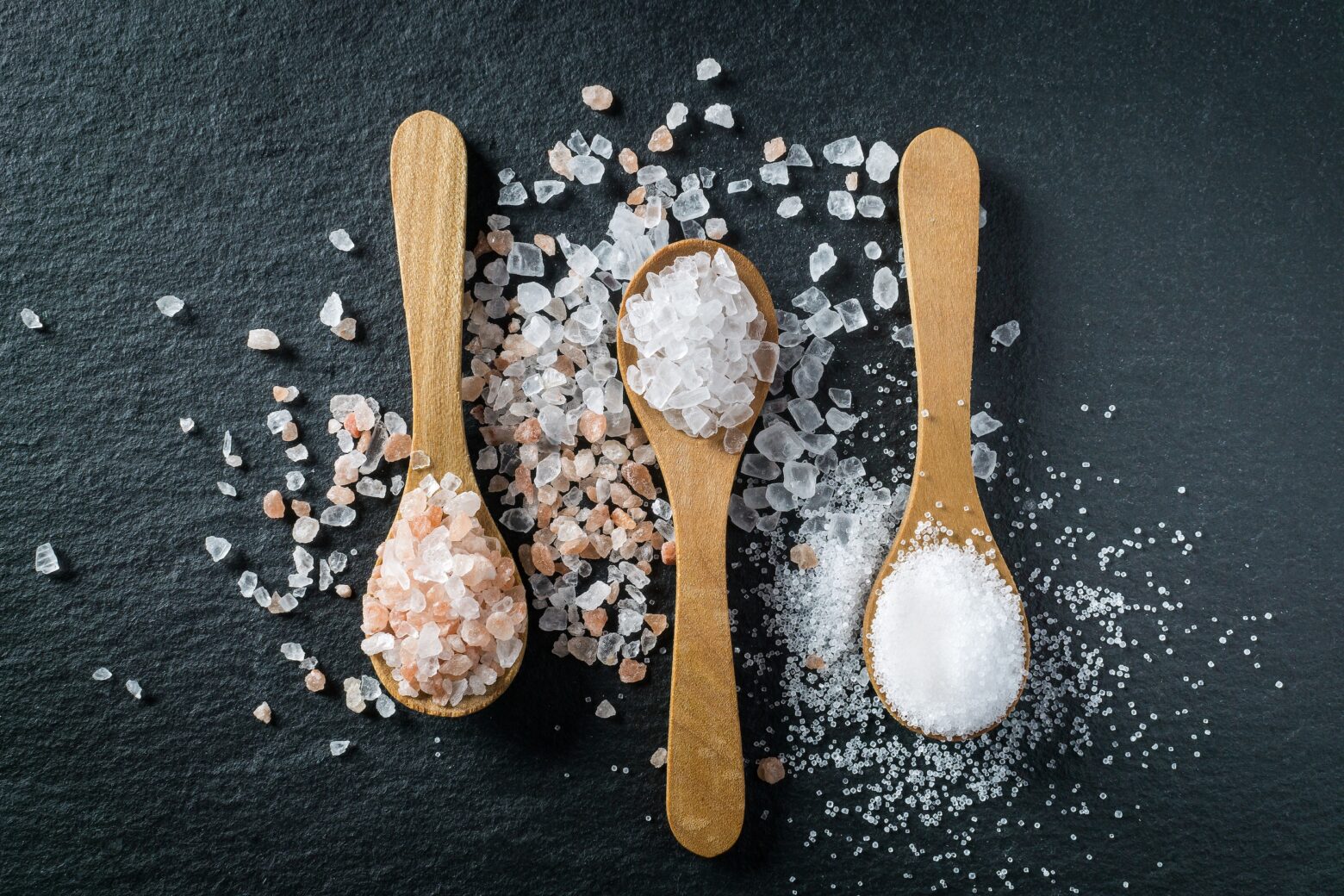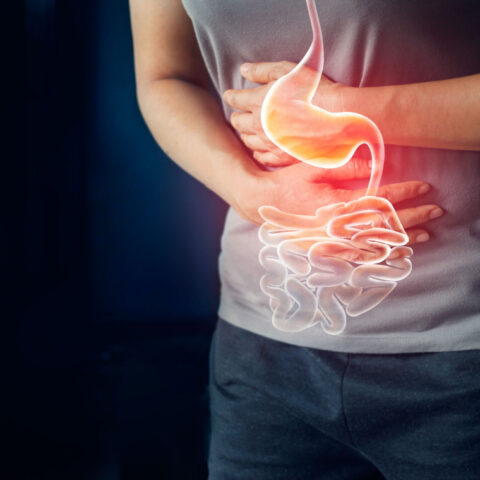A High Salt Diet Can Worsen Autoimmune Diseases

The average American’s daily sodium intake is 37% higher than government recommendations and nearly 300% higher than the estimated sodium intake of ancestral humans. Given the research showing the negative health impacts of even moderately elevated sodium intake, it’s no surprise that science has shown that a high salt diet can worsen autoimmune diseases. Let’s explore how those on an Autoimmune Protocol Diet may want to carefully consider their sodium intake.
Salt is everywhere today in our modern food environment. Over 50 percent of a typical household’s grocery spending goes into ‘ultra-processed’ foods which bring along with them a significant amount of salt (sodium chloride).1
But, in evolutionary terms, it’s only been a staple in the human diet for a very short time.
Our ancestors survived on a diet of less than 1,000mg per day for millions of years, before the introduction of salt into the diet some 5,000 years ago as a method for preserving food.2
Today, the average intake of sodium in the general population is 3,400mg daily, much higher than the recommendation from the Dietary Guidelines for Americans, which says to consume less than 2,300mg per day as part of a healthy eating pattern.3
In fact, modern sodium intake can be as high an 8,000mg per day in some parts of the world, the overwhelming majority coming from processed foods and eating out in restaurants.4
Our current high salt intake is therefore in tremendous excess compared to our ancestral past. Is this a cause for concern for human health?
The most obvious problem is the effect of salt on blood pressure. The evidence from high-quality observational and interventional studies reveals that excessive salt intake is associated with hypertension.5,6 It’s also widely accepted that high salt intake is linked with the development of cardiovascular disease, and it is heavily taxing on the kidneys with some evidence it plays a role in the progression of chronic kidney disease.7,8
A lesser known adverse effect of excessive salt intake is its role in autoimmune conditions like rheumatoid arthritis.
High Salt Diets, Innate Immunity, and Autoimmune Conditions
The innate immune system is the body’s first line of defense, preventing the intrusion of foreign invaders. It responds to infection and other disturbances in homeostasis by activating the body’s inflammatory processes.
In 2009, a ground-breaking animal study found that excessive intake of salt increased skin concentrations of sodium. This increase activated macrophages of the innate immune system to clear the stored sodium through the lymphatic system.9 Macrophages, like many immune cells, can play multiple roles in the body; some macrophages (M1) are pro-inflammatory, while other macrophages (M2) are anti-inflammatory.10
The activation of anti-inflammatory (M2) macrophages has been shown to reduce the development of autoimmune disease.11,12 The problem with a high salt intake is that it increases pro-inflammatory and decreases anti-inflammatory macrophages.13,14
Why would this occur from an evolutionary standpoint?
It appears that infections increase sodium levels inside the cell, leading the local activation of pro-inflammatory macrophages to combat the intruding pathogen, while limiting it in the rest of the body. This phenomenon occurs at all key sites in the body – skin, kidneys, and genitourinary – where the body interfaces with the external environment.
In short, the immune systems response to increased sodium levels is an ancestral protection mechanism against foreign intruders at these locations.
High Salt Diet, Adaptive Immunity, and Autoimmune Conditions
The adaptive ‘seek and destroy’ immune system is also impacted by high salt intake. The specialized cells of the adaptive immune system are activated by the detection of foreign invaders into various T-cells – Th1, Th2, Th17, etc. – in order to target specific intruders.
One important balance in the body is between pro-inflammatory Th17 cells and anti-inflammatory T Regulatory (Treg) cells. Activation of Th17 has been implicated in numerous autoimmune kidney diseases and renal transplant rejection, while Treg activity limits the progression of these conditions.15 Alarmingly, new research on high salt intake finds it increases Th17 and reduces Treg activity, thus potentially worsening autoimmune kidney diseases and likelihood of transplant rejection.16,17
In fact, an imbalance between Th17 and Treg cells has been associated with multiple autoimmune conditions. Emerging research shows a high salt diet could exacerbate a variety of complex conditions, including; multiple sclerosis18,19, inflammatory bowel disease20,21, systemic lupus erythematosus22,23, and acute kidney injury.24,25
Sodium Can Trigger Autoimmune Response
The immune system attempts to maintain homeostasis by keeping a balance between pro- and anti-inflammatory cells. High salt diets promote the activation of both the innate and adaptive immune systems and favor a pro-inflammatory milieu. While under normal conditions, it helps clear infections at the local cellular level, the consequences a chronic pro-inflammatory state due to hypersalinity appears to promote the development of autoimmune disease.
It’s still unclear whether the dietary manipulation of salt can mediate these effects, however, the evidence appears to support a more conservative approach to salt intake. As the majority of salt intake comes from processed food consumption, it’s another great reason to limit your consumption and adopt a ‘food first’ approach consistent with a Paleo dietary eating pattern.
References
- https://www.theguardian.com/science/2018/feb/02/ultra-processed-products-now-half-of-all-uk-family-food-purchases
- Intersalt Cooperative Research Group. Intersat: an international study of electrolyte excretion and blood pressure. Results for 24-hour urinary sodium and potassium excretion. BMJ 1988;297:319-328.
- https://www.cdc.gov/salt/pdfs/sodium_dietary_guidelines.pdf
- Evans, R et al. Emerging evidence of an effect of salt on innate and adaptive immunity. Nephrol Dial Transplant (2018) 1–7 doi: 10.1093/ndt/gfy362
- Smyth A, O’Donnell M, Yusuf, S et al. Sodium intake and renal outcomes: a systematic review. Am J Hypertens 2014; 27: 1277-1284.
- Joossens, J, Hill, M, and Elliott, P. Dietary salt, nitrate and stomach cancer mortality in 24 countries. Int J Epidemiol 1996;25:494-504.
- Lanaspa, M., Kuwabara, M., Andres-Hernando, A et al. High salt intake causes leptin resistance and obesity in mice by stimulating endogenous fructose production and metabolism. Proc Natl Acad Sci USA 2018; 115:3138-3141.
- Sundstrom, B, Johansson, I., Rantapa-Dahlqvist, S. Interaction between dietary sodium and smoking increases the risk for rheumatoid arthritis: results from a nested case-control study. Rheumatology (Oxford) 2015;54:487-493.
- Machnik, A., Neuhofer, W., Jantsch, J. et al. Macrophages regulate salt-dependent volume and blood pressure by a vascular endothelial growth factor-c-dependent buffering mechanism. Nat Med 2009;15:545-552.
- Sica, A., Mantovani, A. Macrophage plasticity and polarization:in vivo veritas. J Clin Invest 2012; 122:787-795.
- Jiang, H., Milovanic, M., Allan, D. et al. IL-33 attenuates EAE by suppressing IL-17 and IFN-c production and inducing alternatively activated macrophages. Eur J Immunol 2012;42:1804-1814.
- Parsa, R., Anderson, P., Gillett, A., et al. Adoptive transfer of immunomodulatory M2 macrophages prevents type-1 diabetes in NOD mice. Diabetes, 2012; 61:2881-2892.
- Jantsch J, Schatz V, Friedrich D et al. Cutaneous Naþ storage strengthens the antimicrobial barrier function of the skin and boosts macrophage- driven host defense. Cell Metab 2015; 21: 493–501
- Binger KJ, Gebhardt M, Heinig M et al. High salt reduces the activation of IL-4- and IL-13-stimulated macrophages. J Clin Invest 2015; 125: 4223–4238
- Sullivan JA, Adams AB, Burlingham WJ. The emerging role of TH17 cells in organ transplantation. Transplantation 2014; 97: 483–489
- Kleinewietfeld M, Manzel A, Titze J et al. Sodium chloride drives autoim- mune disease by the induction of pathogenic Th17 cells. Nature 2013; 496: 518–522
- Wu C, Yosef N, Thalhamer T et al. Induction of pathogenic TH17 cells by inducible salt-sensing kinase SGK1. Nature 2013; 496: 513–517.
- Wilck N, Matus MG, Kearney SM et al. Salt-responsive gut commensal modulates TH17 axis and disease. Nature 2017; 551: 585–589.
- Krebs CF, Paust H-J, Krohn S et al. Autoimmune renal disease is exacer- bated by S1P-receptor-1-dependent intestinal Th17 cell migration to the kidney. Immunity 2016; 45: 1078–1092
- Wei Y, Lu C, Chen J et al. High salt diet stimulates gut Th17 response and exacerbates TNBS-induced colitis in mice. Oncotarget 2017; 8: 70–82
- Aguiar SLF, Miranda MCG, Guimar~aes MAF et al. High-salt diet induces IL-17-dependent gut inflammation and exacerbates colitis in mice. Front Immunol 2017; 8: 1969
- Wu H, Huang X, Qiu H et al. High salt promotes autoimmunity by TET2- induced DNA demethylation and driving the differentiation of Tfh cells. Sci Rep 2016; 6: 28065
- Yang X, Yao G, Chen W et al. Exacerbation of lupus nephritis by high so- dium chloride related to activation of SGK1 pathway. Int Immunopharmacol 2015; 29: 568–573
- Spurgeon-Pechman KR, Donohoe DL, Mattson DL et al. Recovery from acute renal failure predisposes hypertension and secondary renal disease in response to elevated sodium. Am J Physiol Renal Physiol 2007; 293: F269–F278
- Mehrotra P, Patel JB, Ivancic CM et al. Th-17 cell activation in response to high salt following acute kidney injury is associated with progressive fibrosis and attenuated by AT-1R antagonism. Kidney Int 2015; 88: 776–784




